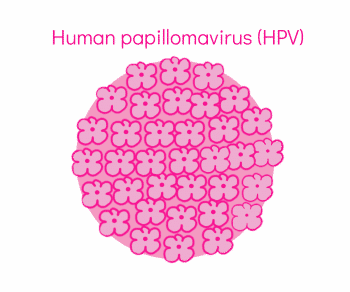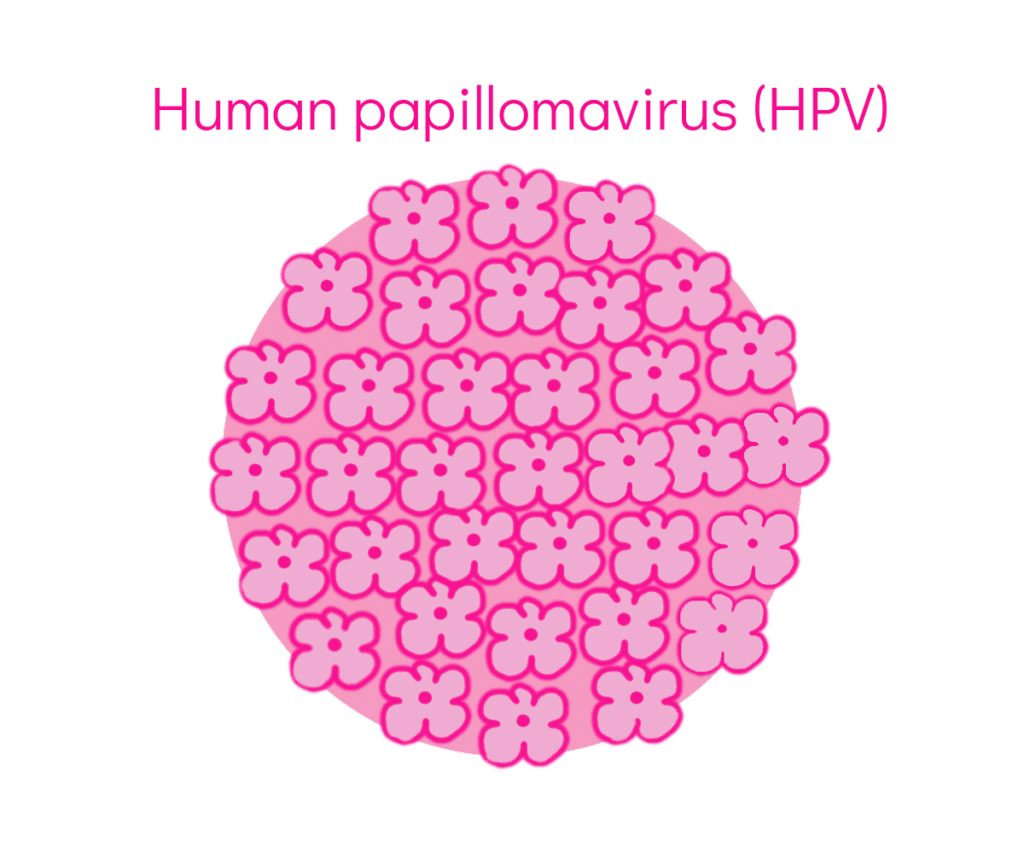Human papillomavirus (HPV) is the leading cause of cervical cancer and is also a suspect in anal, reproductive, and genital cancers.1 HPV involves multiple strains of the same virus, with some strains causing genital warts and some causing cancer, and some doing nothing much at all.
HPV infection is cleared by your immune system usually in one or two years.2 Your antibodies don’t stick around, and because of the many strains, you are able to catch HPV again or catch another strain. This is where vaccination can become useful, even if you have already had an HPV infection. You can protect against more strains, for life.
HPV vaccines are available for men and women for multiple strains of human papillomavirus. Warts (and skin changes) caused by HPV can occur on the genitals, but also on the cervix, vagina, anus, rectum and throat.3 These changes increase the risk of certain types of cancers. Some types of HPV can cause genital warts and cancer.
Over 80 per cent of women will have been infected with at least one strain of HPV before they turn 50 – no symptoms doesn’t mean not infected, and infected doesn’t mean cancer.
Talking about HPV to partners
HPV is something that nobody likes to talk about – women are reluctant to say they have HPV because it means they have ‘a variant of the wart virus’, and a sexually transmitted virus. This is despite the fact that in many countries, regular pap smear testing is performed as a routine check. The pap smear is for the changes caused by HPV specifically.
The way we talk about it has problems; we can feel dirty if we talk about this diagnosis in real terms, so we hide behind the more dramatic cervical cancer testing, without mentioning the virus.
Women and men are both left ignorant of their own bodies and sexual health. The lack of talking extends to men, who spread HPV between sexual partners without any knowledge.
How is HPV spread?
Human papillomavirus is spread by skin contact and sex, which is why 80 per cent of sexually active people will have HPV at some stage in their lives.4,5 We have no information on how long after contracting HPV it can be spread.
HPV – the cancer-causing strains
Warts and skin changes can occur on the genitals, but also on the cervix, vagina, anus, rectum and throat. These changes increase the risk of certain types of cancers. Some types of HPV can cause genital warts and cancer.6,7
HPV of the no-physical-warts varieties (generally types 16 and 18) cause cancer, and it doesn’t matter how old you are. The early 20’s are not a time to die of cervical cancer, so before becoming sexually active (even just touching genitals – it’s passed by skin-to-skin contact, not body fluids), get vaccinated or get regular pap tests.8
Eight out of 10 people have HPV and it can be spread with a dirty finger, the brush of a thigh or other barely-there touching. Condoms help prevent the spread but are not super effective.
There are over 100 strains of wart virus, with only some affecting the genitals and fewer again causing actual warts to appear.

Treating abnormal cells of the cervix caused by HPV
Treating the HPV that affects your cervix may need more invasive work if the cell changes are advanced and do not resolve by themselves. The strain that causes physical warts does not cause cervical changes.
Preventing HPV spread
Vaccines against certain strains of HPV, particularly a couple that cause cancer, are available and are proving their worth with data showing significant reductions in abnormal cervical cells and cancer in certain vaccinated groups.9,10
Everyone can get the vaccine. Condoms are somewhat effective against the spread of HPV.
Pap tests help prevent cervical cancer caused by HPV
Getting regular pap smears means you can catch any cell changes early, and take action before you get cancer. There are certain changes that occur leading up to actual cancer, and these can be treated usually using surgical techniques to actually remove the cells. 11
This treatment leaves the cervix intact, and all reproductive facilities available. Pregnant women and those with HIV/immunocompromised may see rapid growth of warts.
Diagnosis of abnormal cells and genital warts
Your doctor will examine you, and if the genital warts are internal, a colposcopy may be recommended. Genital warts are pretty classic in their appearance and are easy to diagnose.
Any wart that bleeds, looks unusual, develops into a sore or ulcer, or remains after treatment will need to be removed surgically and checked for cancer. Syphilis can also cause genital warts, so a blood test will often be taken for syphilis.
A pap smear will be done if the warts on the cervix to check for cervical cell abnormalities. If anything is found, checks should be performed every six months to catch any changes early.
Can I cure HPV with herbal medicine?
There are some herbal creams in development that could change the way we look at human papillomavirus and the cervix. There is no reason – except a lack of research – stopping novel treatments from being developed that help keep HPV from causing local damage to cervical cells by limiting or inhibiting the virus’s potential in those areas.12
This method is used in the herpes virus with Zovirax and other viral-limiting substances applied in a cream.
More research is required to see what potential herbal medicines have in managing the fallout from human papillomavirus.
Can I cure HPV with natural remedies?
Having a healthy immune system can limit the damage caused by HPV, since the virus is interacting with your body’s immune cells constantly. HPV will eventually be eradicated from your body, but how long this takes and what damage is done in the meantime is not really known and differs widely between people.
What we do know is that a healthy immune system will knock the virus out faster than a weak immune system.
Some new treatments include a substance called AHCC, a mushroom extract, that looks promising in helping to clear HPV faster13.
You have some power to reduce known risk factors for developing cancer from HPV, which includes stopping smoking. Smoking is a huge risk factor for HPV causing cervical cancer.
References
- 1.Stanley M. Pathology and epidemiology of HPV infection in females. Gynecologic Oncology. Published online May 2010:S5-S10. doi:10.1016/j.ygyno.2010.01.024
- 2.Dunne EF, Park IU. HPV and HPV-Associated Diseases. Infectious Disease Clinics of North America. Published online December 2013:765-778. doi:10.1016/j.idc.2013.09.001
- 3.Ljubojevic S, Skerlev M. HPV-associated diseases. Clinics in Dermatology. Published online March 2014:227-234. doi:10.1016/j.clindermatol.2013.08.007
- 4.Pauli S, Kops NL, Bessel M, et al. Sexual practices and HPV infection in unvaccinated young adults. Sci Rep. Published online July 20, 2022. doi:10.1038/s41598-022-15088-8
- 5.Sabeena S, Bhat P, Kamath V, Arunkumar G. Possible non‐sexual modes of transmission of human papilloma virus. J of Obstet and Gynaecol. Published online February 6, 2017:429-435. doi:10.1111/jog.13248
- 6.Petry KU. HPV and cervical cancer. Scandinavian Journal of Clinical and Laboratory Investigation. Published online August 2014:59-62. doi:10.3109/00365513.2014.936683
- 7.Gupta S, Kumar P, Das BC. HPV: Molecular pathways and targets. Current Problems in Cancer. Published online March 2018:161-174. doi:10.1016/j.currproblcancer.2018.03.003
- 8.Aksoy P, Gottschalk EY, Meneses PI. HPV entry into cells. Mutation Research/Reviews in Mutation Research. Published online April 2017:13-22. doi:10.1016/j.mrrev.2016.09.004
- 9.Falcaro M, Castañon A, Ndlela B, et al. The effects of the national HPV vaccination programme in England, UK, on cervical cancer and grade 3 cervical intraepithelial neoplasia incidence: a register-based observational study. The Lancet. Published online December 2021:2084-2092. doi:10.1016/s0140-6736(21)02178-4
- 10.Gravitt PE. The known unknowns of HPV natural history. J Clin Invest. Published online December 1, 2011:4593-4599. doi:10.1172/jci57149
- 11.Cox B, Sneyd MJ. HPV screening, invasive cervical cancer and screening policy in Australia. Journal of the American Society of Cytopathology. Published online November 2018:292-299. doi:10.1016/j.jasc.2018.07.003
- 12.Akhavan S, Mousavi A, et al. Genital Warts (Anogenital warts). J Obstet Gynecol Cancer Res. Published online March 1, 2017:0-0. doi:10.5812/ogcr.11440
- 13.Smith JA, Mathew L, Gaikwad A, et al. From Bench to Bedside: Evaluation of AHCC Supplementation to Modulate the Host Immunity to Clear High-Risk Human Papillomavirus Infections. Front Oncol. Published online March 20, 2019. doi:10.3389/fonc.2019.00173
The most comprehensive vaginal microbiome test you can take at home, brought to you by world-leading vaginal microbiome scientists at Juno Bio.
Unique, comprehensive BV, AV and 'mystery bad vag' treatment guide, one-of-a-kind system, with effective, innovative treatments.
Promote and support a protective vaginal microbiome with tailored probiotic species.






